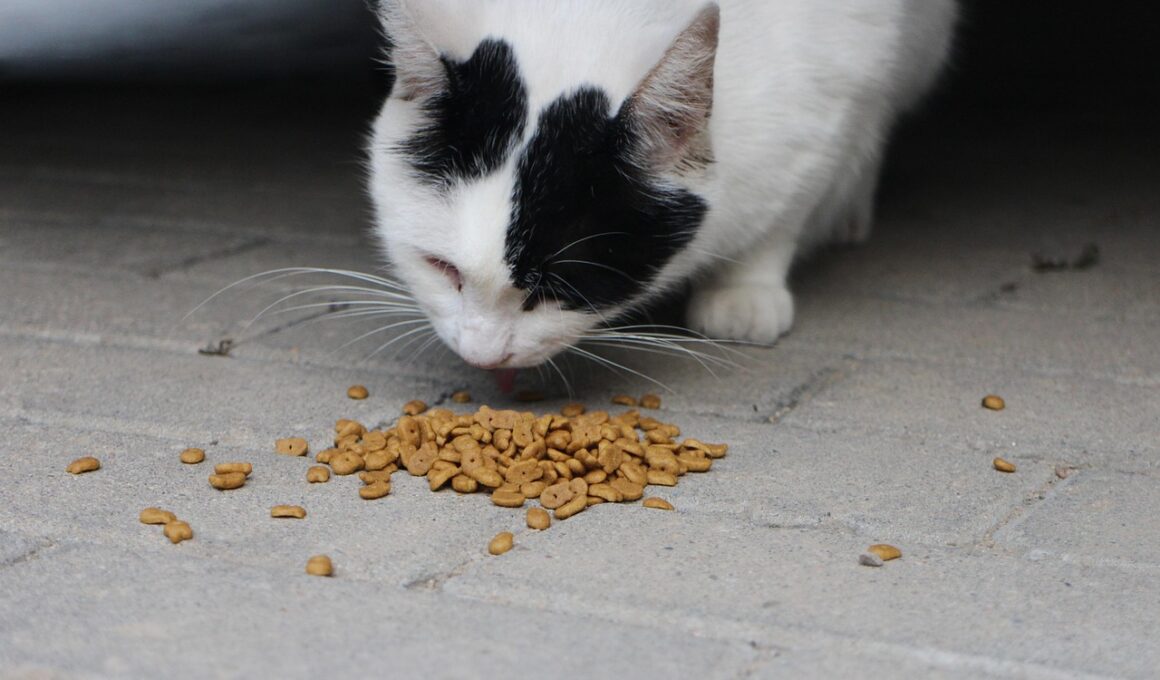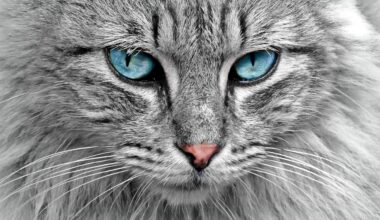The Role of Nutrition in Managing Cat Food Allergies
When it comes to adopting cats, understanding their nutritional requirements is crucial, especially for those with special dietary needs. Food allergies can cause various health issues, leading to discomfort and dissatisfaction in our feline friends. Identifying the ingredients causing the allergic reactions is the first step towards recovery. This involves working closely with a veterinarian to pinpoint allergens through elimination diets or specific allergy tests. Some common allergens include beef, dairy, and wheat, but each cat may react differently. Hence, it is essential to pay attention to any unusual signs or symptoms. These may include itching, gastrointestinal problems, or skin irritations. Once allergens are identified, a specialized diet can be designed. Consider consulting veterinary nutritionists for tailored plans that meet your cat’s specific needs while avoiding harmful ingredients. Additionally, ensure all foods offered are high-quality and well-balanced. This will give your cat the best chance at a healthier life, free of allergic reactions. Always introduce new foods gradually to monitor any adverse reactions to a new diet. Regularly connect with your vet for successful management and adjustments as needed. Awareness is key in supporting your beloved cat’s health.
Not all cats are allergic to the same foods, requiring careful attention to individual preferences. If your adopted cat shows signs of discomfort after meals, it may be beneficial to keep a journal of what they eat alongside their symptoms. This record can provide invaluable insights for your veterinarian in diagnosing food allergies efficiently. Once a problem ingredient is identified, it’s essential to look for products that offer hypoallergenic or limited-ingredient diets designed specifically for cats with allergies. These diets typically contain novel protein sources such as duck or venison, avoiding common allergens. Furthermore, adding supplements like omega fatty acids can aid in enhancing skin health and reducing inflammation. Choose high-quality brands that provide transparent ingredient lists. You might also want to explore homemade diets with the guidance of a vet to ensure completeness. Exploring alternative food formulations could provide relief to kitties struggling with sensitivities. Ensure you transition any new food slowly over 7 to 10 days. Monitoring your cat’s reaction to these changes will help ensure positive outcomes, fostering a healthy lifestyle for your new furry family member. Remember, a well-nourished cat is generally a happy cat.
Notably, ensuring your cat’s meals are free from cross-contamination is equally important. If you have other pets, be diligent about separating food areas and feeding times. Utilizing separate bowls and feeding areas can prevent accidental ingestion of allergenic food that could harm your sensitive kitty. Additionally, constantly review and research cat food brands when shopping for cat food. Staying updated on recalls, reviews, and ingredient changes will ensure your cat’s safety and health. Focus not only on commercial foods but also consider options like raw diets. Before making any significant dietary changes, consult with your veterinarian. They can guide you through the potential benefits and risks associated with various feeding strategies. A well-balanced, nutritious diet tailored to avoid allergens can dramatically improve your cat’s well-being. Also, keep an eye on your cat’s weight, as dietary changes could affect appetite. An appropriate diet naturally leads to a healthier weight, easing many secondary health issues. It’s advisable to revisit your vet regularly for check-ups and dietary evaluation. The goal is to create a long-term, sustainable approach to nutrition that aligns with your kitty’s unique needs.
Food Sensitivities and Their Impacts
Food sensitivities in cats can significantly hinder their quality of life. Effects can manifest in various ways, including chronic ailments, itchy skin, and digestive issues like vomiting or diarrhea. In some cases, these sensitivities can lead to behavioral changes, as discomfort can heighten irritability. Understanding these sensitivities requires a comprehensive approach, including close dialogue with your veterinarian. They may recommend specific tests to diagnose underlying allergies accurately; this could involve blood tests or skin prick tests. Conducting a thorough investigation of your cat’s health history helps identify potential allergens and their impact. It is also worthwhile to monitor seasonal variations, as certain ingredients in commercial foods may fluctuate in availability, potentially exacerbating reactions. Some cats may react differently to ingredients seasonally or depending on their environment. Regular evaluations of your cat’s dietary needs can spell the difference between discomfort and a thriving existence. Always adopt a proactive stance regarding your cat’s nutrition and overall health. This practice helps you to detect any changes early on and adapt their food choices accordingly. A detailed plan tailored to your cat’s needs leads to happier, healthier feline companions.
Furthermore, it’s essential to instill a routine check of labels on commercial cat food before purchase. “Grain-free” does not always equate to being hypoallergenic or suitable for your ailing pet. Become familiar with the terminology and ingredient sourcing to make informed decisions. Also, introducing new treats or food items should be approached cautiously due to the risk of reactions. Stick to familiar brands or vet-recommended products. Managing food allergies necessitates consistency in your cat’s diet and gradually making any modifications. Celebrate any gradual improvements in your cat’s health as you refine their food. Once your cat is on a suitable diet, please take note of any changes in energy levels or overall behavior. An increase in overall vitality may indicate the right food choice is being made. Also, understand the importance of hydration alongside nutrition; providing fresh water is essential for your cat’s health. Regular check-ups and monitoring your cat’s well-being will assist in ensuring they continue to thrive. Through ongoing research and an attentive approach, you can effectively manage your cat’s dietary issues and allergies.
The Essential Role of Vets
The role of veterinarians in managing food allergies and special dietary needs cannot be overstated. These experts provide individual dietary assessments that consider your cat’s health status, breed, age, and lifestyle. This comprehensive evaluation can lead to the development of a specialized dietary plan effectively addressing specific sensitivities. Regular consultations with your vet can ensure proper monitoring of your cat’s reaction to new foods. This continuous loop of communication is vital for making necessary adjustments and improvements as needed. Don’t hesitate to reach out with concerns, especially when trying new foods or treats. A proactive approach in addressing dietary issues can lead to more successful outcomes. It’s not uncommon for food allergies to change or evolve over time; thus, remaining vigilant is crucial. Schedule regular health check-ups and ensure all of your cat’s health needs are covered. These appointments provide excellent opportunities to review food choices, supplementation, or advanced diagnostic assessments if required. A trusting relationship with your veterinarian helps in delivering the best healthcare for your pet. The journey through food allergies can be complex, but with informed decision-making, the right support can enhance your cat’s lifestyle.
In conclusion, adopting a cat with special dietary needs, especially those with food allergies, can be successfully managed with dedication and knowledge. By understanding nutrition’s role, partnering closely with your veterinarian, and being proactive about your cat’s food choices, you can foster a healthy, thriving environment. Taking the time to identify specific allergens and nutritional requirements lays the groundwork for a solid foundation. Focus on regular monitoring, consistent vet check-ups, and communicating changes or concerns. A tailored diet can significantly improve your cat’s quality of life alongside supplementation as needed. With these supportive measures, your feline companion can live comfortably and happily. Always stay inquisitive; research products, and adapt to new findings regarding pet nutrition. Dedicate yourself to refining this process for the best outcomes. Engaging with other fellow cat owners may provide additional insights and resources. Together, keep sharing knowledge in the cat adoption community. Ultimately, embracing your cat’s unique dietary journey signifies a loving commitment to their wellbeing. Remember, a well-fed cat lives a happy life, and attention to nutrition can lead to endless joys with your newly adopted friend.
Ultimately, support from a community and a reliable veterinarian can make all the difference in managing your picky feline’s dietary needs. Whether you are just starting your journey in cat adoption or have years of experience, each cat requires a unique approach to their food preferences and health. Embrace flexible strategies and open communication that can improve your cat’s dietary regimen. Attend workshops, read literature, and connect with other cat owners facing similar challenges to enhance your understanding. Sharing experiences can provide comfort and solutions that work in everyday situations. Cat adoption is a journey filled with companionship and love. Nourishing your furry friend right is a critical step in strengthening your bond. Take pride in each successful improvement in your cat’s health, creating a joyful atmosphere in your home. The journey of managing food allergies is a shared experience, fostering growth and commitment to our beloved pets. Stay vigilant and diligent, allowing each moment to be an opportunity for connection. Every action taken towards improving your cat’s diet illustrates your commitment to their quality of life. Together, navigate the complexities of pet ownership, leading to a fulfilling partnership that benefits both you and your beloved feline friend.


